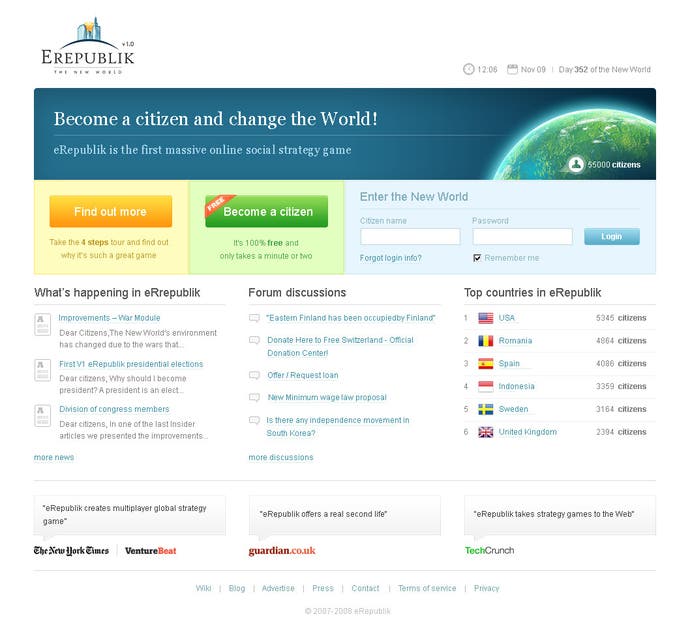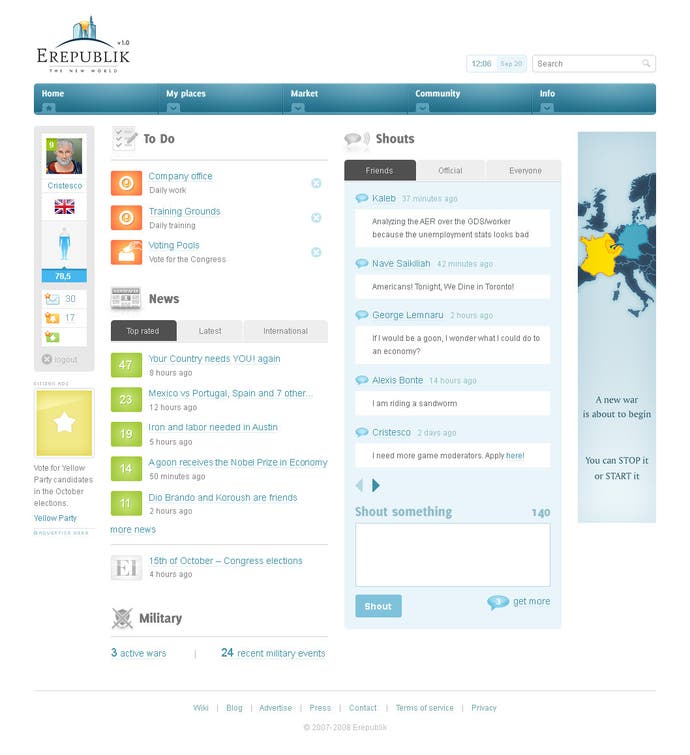eRepublik
Bite-sized democracy.
It wasn't widely reported, but in April of this year, the United States declared war on Canada. Perhaps it was inevitable - the smug superiority over low gun crime figures, that cruel stranglehold on the world's moose resources, or maybe just the country's odd propensity for coming up with place names like Flin Flon and Winnipeg - whatever the reason, the US of A seemed to feel that its neighbour to the north had it coming. It certainly looked like the whole business was going to be over quickly: on one side, a nation of proud arms-bearing hyper-capitalists hepped up on Big Tastys and Buffalo Jerky, and on the other, a cadre of unnaturally polite international backpackers. What could possibly go wrong for Uncle Sam?
Alexis Bonte, the man who indirectly made this invasion possible, has been quick to distance himself from any fallout, however. "I didn't do this!" he says, when asked for a comment. "It was the users who did it." Bonte also adds that, once the dust had settled, the outcome turned out to be rather unexpected. "The US had about 1000 inhabitants at the time, and Canada had just 200. If this was all AI-driven, it would have been over in a few hours. Instead, the President of Canada was a pretty clever fellow. He called Spain, asked for forty of their best soldiers, and paid them well. So now there was a Spanish mercenary army showing up, and then the French Foreign Legion joined in, and eventually the US started losing the war and had to sue for peace! They paid thousands in reparations." The world, it seems, can be a surprising place when you look at it through the lens of an internet browser.

This invasion - and many like it since - took place in the fictional world of eRepublik, a bold collision of MMO, strategy game, and social networking site. Look at it one way, and eRepublik seems a lot like the world you already live in: you're a citizen of a country, you have to get a job in order to buy food, and if you're clever enough, or just horribly persistent, you can rise through the ranks to fame, wealth, and power. Look at it another way, and it's more like Facebook: a simple white page, largely text-based, with a scattering of innocuous-looking icons and update panels. Either way, someone like William Gibson is probably studiously wetting himself (if that's possible) at the prospect of a fully-functioning world-in-a-bottle peering out of his iMac screen. He would, wouldn't he? He's half Canadian, after all.
"The logic was the following," says Bonte, chief executive and co-founder of Tevin Solutions, the company behind the game. "eRepublik was never going to look like a typical MMO. With the 3D way, the problem is that you need a really powerful machine, and you need a downloaded client most of the time. You can't do it in a browser so easily. At the end of the day, we thought, 'We're building a strategy game. They don't need that many bells and whistles.' What you want is that experience where you play something like Risk. We then combine that with the user-generated potential of the web, and then the social tools that you find in things like Facebook, and what you get is really interesting."

What you get, in fact, is America invading Canada, and sharpish. But while eRepublik is a game with a truly massive scope - it aims to provide a user-directed simulation of a world that's broad enough to capture geopolitics, social trends, and global economics, yet sufficiently detailed to cover what it's like to lose your job at a tyre factory and subsequently starve to death - it's been designed with the needs of a casual audience in mind. All you need to get stuck into the game is an internet connection, an email account, and roughly fifteen minutes of free time every day. This thing is going to be huge in prisons.
"We designed the game for people like me who are great fans of strategy games but no longer have the time to play them," says Bonte. "You know the feeling, you're playing Civilization at eight in the evening, you look at the clock again, and it's two in the morning. So we wanted to design a game with the same depth, but instead of a lot of hours over a short number of days, it's a fifteen-minute experience over several months."

